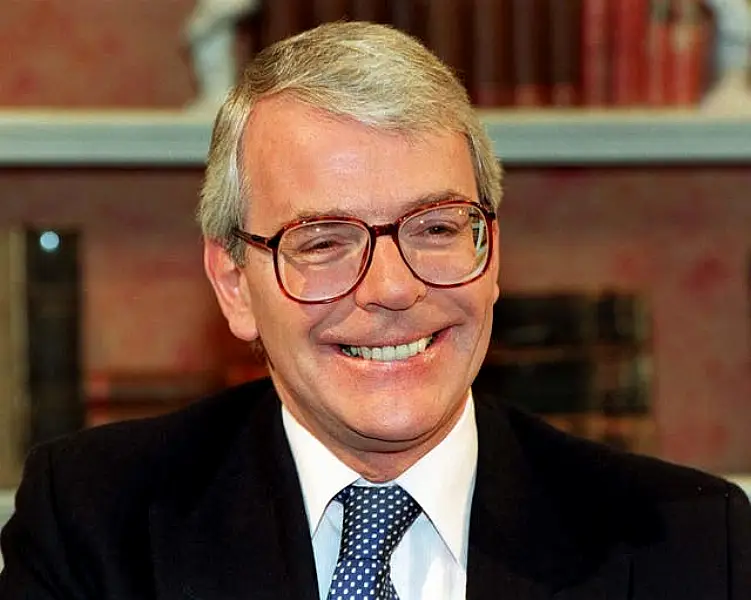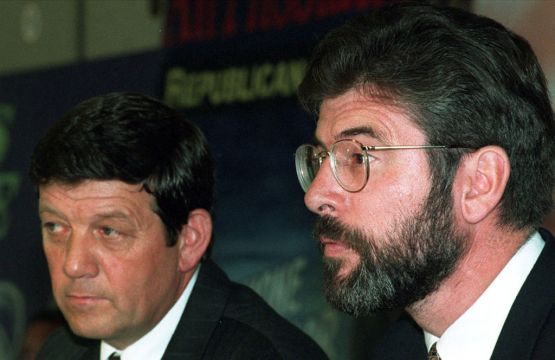John Major told the Taoiseach in November 1996 that nobody in Britain “believes a word” from Sinn Féin and the IRA, nine months after the end of the first ceasefire.
In a telephone call on November 6th, 1996 with Taoiseach John Bruton amid efforts to restore an IRA ceasefire, Mr Major accused Sinn Féin of engaging in “black widow quadrille” and questioned the basis of the belief from the Irish Government that the IRA was serious about decommissioning and peace.
Despite the optimism from the Irish Government at the time, a new IRA ceasefire would not be called until July 1997.
The call reveals the frustrations in London and Dublin with both Sinn Féin and the IRA, as violence continued across Northern Ireland alongside attempts to inject momentum into all-party talks.
Mr Bruton expressed optimism about the possibility of an IRA ceasefire.
Mr Major, according to an Irish Government record of the call, told the taoiseach that the two had a difference of opinion on the inclusion of Sinn Féin in talks.
“We have been pretty scarred by what we now know from intelligence they were doing, they were doing all time they were doing the ceasefire and I think you’ve made the point yourself publicly and certainly in our discussions but publicly that they would need to demonstrate the credible nature of any ceasefire.”
In a back-and-forth with the taoiseach, the British prime minister said: “What I am not sure about is why you are convinced the position has changed, because the evidence that we get suggests it to be frankly quite the contrary.
“It suggests that if anything what Sinn Féin are engaged in is a black widow quadrille to try and convince people that they are going to make movement without in practice doing so and if others are then convinced, seeking to shoulder the blame on to others for the lack of progress.
“Well if you have any concrete evidence I would be very pleased.

“I am not sure why you are convinced that it has changed. We certainly aren’t.”
In the call, Mr Bruton told the prime minister: “I marvel at times at the patience of the British public in the face of some of the activities of the IRA in England.”
He stressed that the Irish position would not involve Sinn Féin entering negotiations immediately “other than in the most formal sense”.
He insisted that the party would still have to sign up to the so-called Mitchell Principles as pre-conditions to join the talks.
Mr Bruton admitted he did not believe that Sinn Féin could be persuaded to sign up to parallel decommissioning.
He told Mr Major: “I don’t think that [SDLP leader] John Hume is going to obtain from them. I didn’t think he would when I heard him suggest it. But if he does I will be happily surprised.”
He also admitted that he couldn’t say for certain whether IRA and Sinn Féin statements were “for real”.
“I believe that Sinn Féin are like a lot of political organisations, who basically pursue one strategy, but have an alternative strategy in their back pockets at all times.
“I think they are pursuing a strategy of getting into negotiations at the moment, but they are not going to give up their alternative until they are satisfied that the strategy they are following is going to get them somewhere.”
In his response, Mr Major revealed the deep distrust felt by the British government at this point in negotiations.
Telling Mr Bruton that his government needed a stronger declaration from the IRA, he said: “In terms of the British position, in terms of the way people are feeling over here I have no difficulty whatever in standing pat because nobody believes a word Sinn Fein/IRA say.”
He continued: “I think the game is more important than that so I am certainly prepared to take risks if I think there is a credible reason of them coming through but I have just been reading a stack of reports suggesting to me that there is nothing serious in this at all from their point of view and that that is not the game they are playing.”
The material can be viewed in the National Archives in file 2021/98/5.







